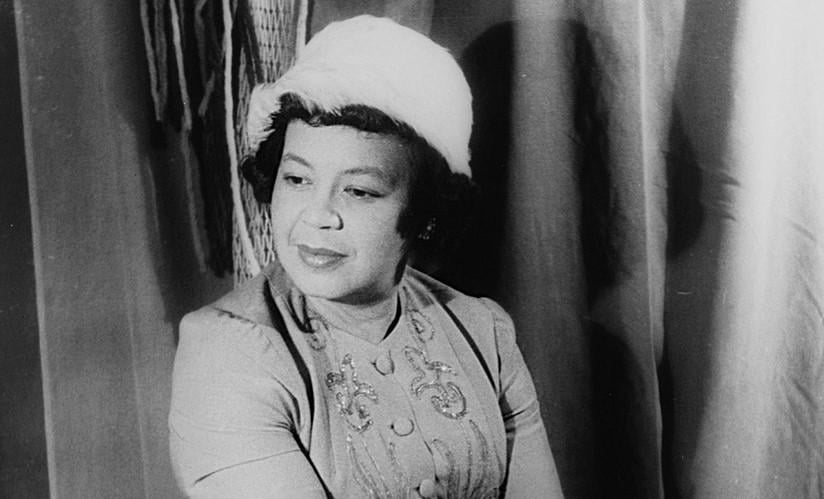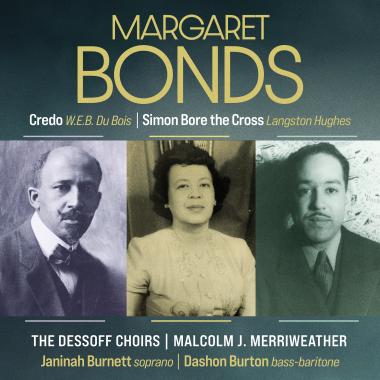
For many music lovers, the work of Black composer, pianist, arranger, and teacher Margaret Bonds (1913–1972) remains sadly unknown. Given her music’s power, beauty, and subject matter, that’s a crying shame.
Born in Chicago to an activist/physician/writer father and church musician mother, Bonds was still in high school when she studied piano and composition with no lesser personages than Florence Price and William Levi Dawson. Admitted to Northwestern University at age 16 — she was one of few Black students and was not allowed to reside on campus – she received her bachelor’s and master’s degrees and then studied at The Juilliard School.
In 1933, Bonds became the first Black soloist to perform with the Chicago Symphony Orchestra. She was also the CSO’s chosen soloist for Price’s Piano Concerto in D Minor.

In 1936, Bonds began a lifelong friendship with African American poet Langston Hughes. It was with her setting of Hughes’s uplifting poem “The Negro Speaks of Rivers” that Bonds reached out to famed composition teacher Nadia Boulanger with a proposal to study with her in France. Boulanger replied that Bonds had no need of further study.
In 1939, Bonds moved to New York City where, 13 years later, she made her solo performing debut at Town Hall. During her time in Harlem, she formed the Margaret Bonds Chamber Music Society, who mainly performed the music of Black composers.
Over 90 percent of Bonds’s works set text. The recording at hand, simply titled Margaret Bonds (Avie), contains two of her most striking late choral works: Credo, to text by W.E.B. Du Bois, and Simon Bore the Cross, to text by Hughes. The Dessoff Choirs and Orchestra of New York, conducted by Malcolm J. Merriweather, do the performing honors with two soloists, soprano Janinah Burnett and bass-baritone Dashon Burton. Both works are revelations.
Bonds and Du Bois’s Credo is an uncompromising affirmation of Black identity. “I believe that all men, black and brown and white, are brothers” and contain within their “alike” souls “the possibility of infinite development,” declares the excellent chorus in the first of seven sections. “Especially do I believe in the Negro race [and] pride of race and lineage and self,” the chorus and Burnett declare in the next sections. With each declaration, the music grows increasingly powerful and stirring until it takes a beautiful pastoral turn in the fifth section, “I Believe in the Prince of Peace.” Burton begins the sixth section, “I Believe in Liberty,” in ideally handsome voice. After that section’s thrilling climax, the work concludes with “I Believe in Patience.”
Credo received its first performance, in excerpted orchestral form, from the Los Angeles Philharmonic under Zubin Mehta one month after Bonds’s death. The first complete performance took place in 1973.
Simon Bore the Cross, which neither Hughes nor Bonds lived to see published or premiered, focuses on Simon of Cyrene, the North African who carried Jesus’s cross on the way to Calvary. For African Americans who only saw white-skinned, blue-eyed images of Jesus, Hughes’s words and Bonds’s setting were intended to help underscore the essential role of people of color in the life of Jesus.
The eight-section work opens with an extremely grave and profound orchestral Prelude. The music, alternately consoling, sympathetic, and filled with pain, carefully reflects the text. Like Du Bois, Hughes is explicit when he introduces Simon as Black and then declares, “Black men will share the pain of the cross. In a world … that’s filled with trials and troubles, Simon out of Africa shares your sorrow.” The music is wonderful, and its occasional references to Black spirituals profound.
Despite a bit of wobble when singing softly and some pressured high notes, Burton’s voice is a joy, his diction superb. Burnett, who here sounds right out of the gospel tradition, is equally strong, with her most arresting tones higher in the range. The sustained C-sharp at the close of the second movement of Credo is a stunner. Highly recommended.



